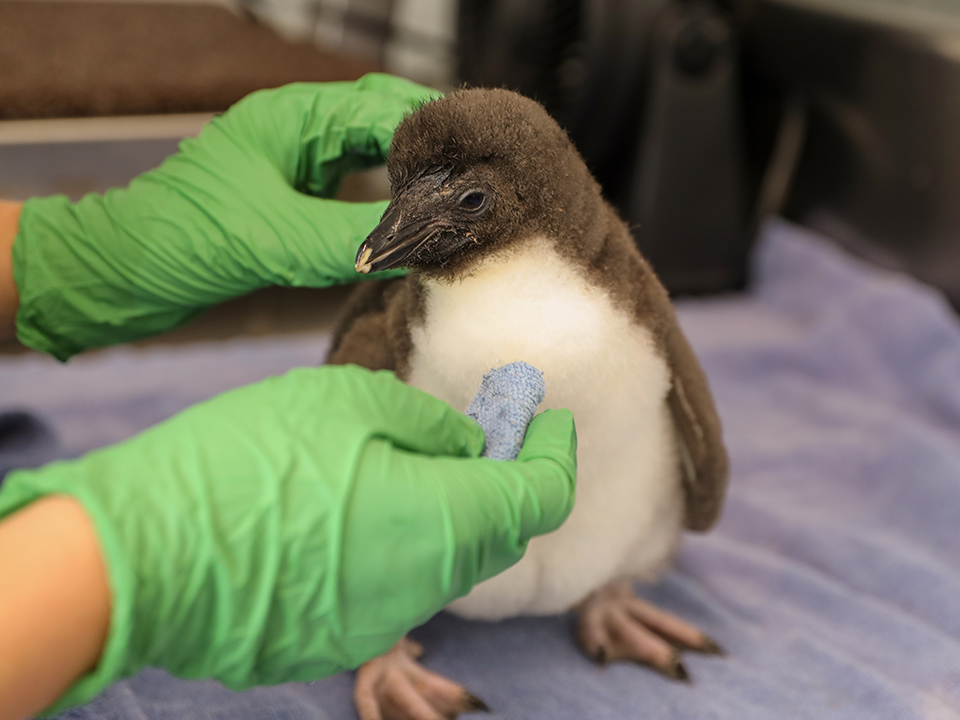
BOSTON, MASS. (Aug. 2, 2023) – For the first time since 2019, the New England Aquarium is caring for a southern rockhopper penguin chick that hatched behind the scenes.
*PHOTOS AND VIDEO AVAILABLE HERE WITH CREDIT TO NEW ENGLAND AQUARIUM*
The female chick hatched on June 23 after requiring medical intervention from Aquarium staff. Penguin parents Pebble II and Fuego II had been caring for their egg when it began hatching, but the chick struggled to break through the shell. The Aquarium’s Animal Care team gave the chick a chance to fully hatch on her own but ultimately decided to intervene to ensure the best chance of survival.
“Eggs can take 24 to 48 hours to hatch, but we weren’t seeing much progress from the chick on its own and were concerned it was too weak,” said Dr. Melissa Joblon, Director of Animal Health at the Aquarium.
The assisted hatch unfolded over the course of several hours, with veterinarians gradually peeling back the outer shell and membrane.
The emerging chick was put in an intensive care unit overnight to maintain its body temperature and have a quiet space to finish the hatching process. Staff members provided round-the-clock care, monitoring the chick throughout the night. When the hatch was finished the next day, the chick’s parents were given an opportunity to take on parental duties and raise the chick, but the process was not successful. At that point, penguin trainers began hand raising the chick, leading to intensive round-the-clock care by more than 10 staffers.
“Caring for a penguin chick is like caring for a human baby: It truly takes a village. Our dedicated staff jumped at the opportunity to spend their late hours helping provide the chick all of the care that it needed,” said Assistant Curator of Penguins Eric Fox.
In the days that followed, the chick was given a specialized formula—which is a milkshake-like blend of fish, krill, vitamins, and supplements—and fed five times a day. A month later, she is now eating full fish with three feedings daily and is 17 times her hatch weight at just over three pounds. Veterinarians confirmed the female sex via genetic testing of the umbilicus (navel).
Penguin trainers have begun socializing the chick behind the scenes by introducing her to the Aquarium’s other resident rockhopper penguins. Once the chick’s waterproof feathers have grown in and she receives a full medical examination, likely sometime in the fall, trainers will introduce her on exhibit, where she will join the colony of 13 rockhopper penguins.
“Although there are many milestones to go, we are seeing great signs that we have a healthy, thriving chick,” Fox said.
Once the time comes for her to join the colony, the chick’s name will also be chosen and revealed. By electing to give penguins names linked to natural history and conservation, the Aquarium is able to connect with and educate guests on these ambassadors for their species.
Southern rockhopper penguins are considered a vulnerable or threatened species. Over the past three to four decades, their numbers have dropped by about 35%, with climate change and the associated warming of the ocean surrounding their habitats cited as a major factor. Wild colonies also face threats including depletion of their food source, overfishing, and pollution from incidents such as oil spills.
MEDIA CONTACT: Pam Bechtold Snyder, psnyder@neaq.org; 617-686-5068
